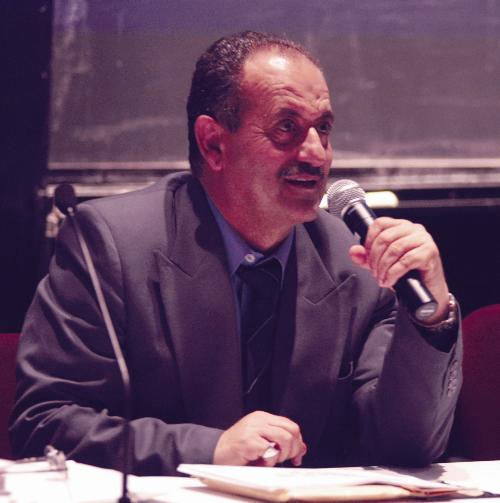
News
Summers Will Not Finish Semester of Teaching as Harvard Investigates Epstein Ties

News
Harvard College Students Report Favoring Divestment from Israel in HUA Survey

News
‘He Should Resign’: Harvard Undergrads Take Hard Line Against Summers Over Epstein Scandal

News
Harvard To Launch New Investigation Into Epstein’s Ties to Summers, Other University Affiliates

News
Harvard Students To Vote on Divestment From Israel in Inaugural HUA Election Survey
Scholars Say Iraqi Ed on Rebound
President of Baghdad U. discusses Iraqi universities’ poverty, isolation

A panel of four Iraqi academics, including the President of the University of Baghdad, painted a bleak picture of the state of Iraqi higher education on Monday evening, but said they were confident that a stable system of education could be rebuilt in the war-torn country.
Speaking in the Science Center, the panel addressed the difficulties inherent in teaching and conducting research in a country that has been isolated by two decades of dictatorial rule, torn apart by three major wars, and subjected to widespread looting in the wake of the 2003 U.S.-led invasion of the country.
The panelists said that a massive influx of resources—including money, technology, and training—would be needed to rebuild and modernize Iraq’s universities.
“We are desperate,” Iraqi Deputy Minister of Science Beriwan Khailanym said.
The four Iraqi officials complained about lacking resources that many Western universities take for granted. Mosa Jawad Aziz Almosawe, the President of the University of Baghdad, repeatedly mentioned a pressing need for more seats and blackboards in classrooms.
Khailanym showed the audience, approximately 100 people, a slideshow presentation of Basra University—from its dilapidated laboratories and overcrowded classrooms to its empty-shelved and unelectrified library.
The looting that took place in the immediate aftermath of the 2003 attacks devastated Iraq’s universities, according to Almosawe. He said that two of his University’s three campuses saw damage to 80 percent of their facilities. The third campus saw no damage.
The panel, which also included the University of Baghdad’s deans of science and engineering, said that the problem was as much intellectual as infrastructural. Saddam-era embargoes restricted the flow of both foreign technology and information into Iraq, while professors were barred from attending academic conferences abroad.
“For the last 20 years, we were not allowed to leave the country. Our faculties need quite a while to be retrained,” said Khailanym, who led the panel. “We are behind everybody by 15 years, and we have come to Harvard to know where we are among our counterparts.”
Under Saddam, many of the country’s top intellectuals had fled the country, and Khailanym said that their return is crucial to the rejuvenation of Iraqi universities. She said that since 1980, approximately 30,000 Iraqi academics had fled the country.
“Our silver lining is our academics abroad,” she said.
There are 21 universities and nine private colleges in Iraq. Together with a handful of technical schools, these institutions serve a total of 380,442 Iraqis.
Iraq’s Ministry of Higher Education supports 18 of those universities and 51 research institutes on a budget of just under $200 million, according to Khailanym.
And Almosawe complained that financial assistance has been slow to materialize, saying that the U.S. has been particularly unhelpful.
Thus far, the Iraqi Reconstruction of Higher Education Commission has approved spending of $25 million to rebuild damaged buildings, the World Bank has offered a $15 million equipment grant, and the wife of the emir of Qatar has also donated $15 million to an international fund for Iraqi higher education.
In a question-and-answer session after that followed the discussion, panelists downplayed the difficulties posed by ethnic differences, characterizing Sunni-Shiite-Kurdish tension as largely the invention of the Western media.
The panel, which was hosted by Mallinckrodt Professor of Physics and Research Professor Richard Wilson, did acknowledge the difficulty of rebuilding the universities in the midst of a violent insurgency that has targeted academics.
“All people who have positions in government are targeted. If we lose our professors, there will be chaos in the whole country,” Khailanym said. “We have lost quite a lot of them in the last two years.”
The panel said that the university education system must be rebuilt to sustain positive change.
“An old Swiss philosopher once said that when you open a school, you close a prison,” University of Baghdad Dean of Science Abdul Mahdi Taleb Rahmatalla said.
—Staff writer Samuel C. Scott can be reached at sscott@fas.harvard.edu.
Want to keep up with breaking news? Subscribe to our email newsletter.
